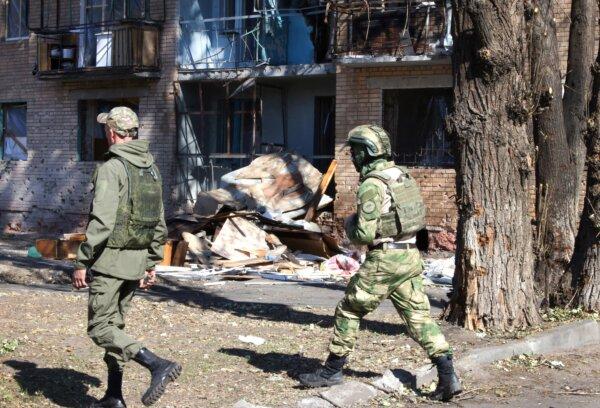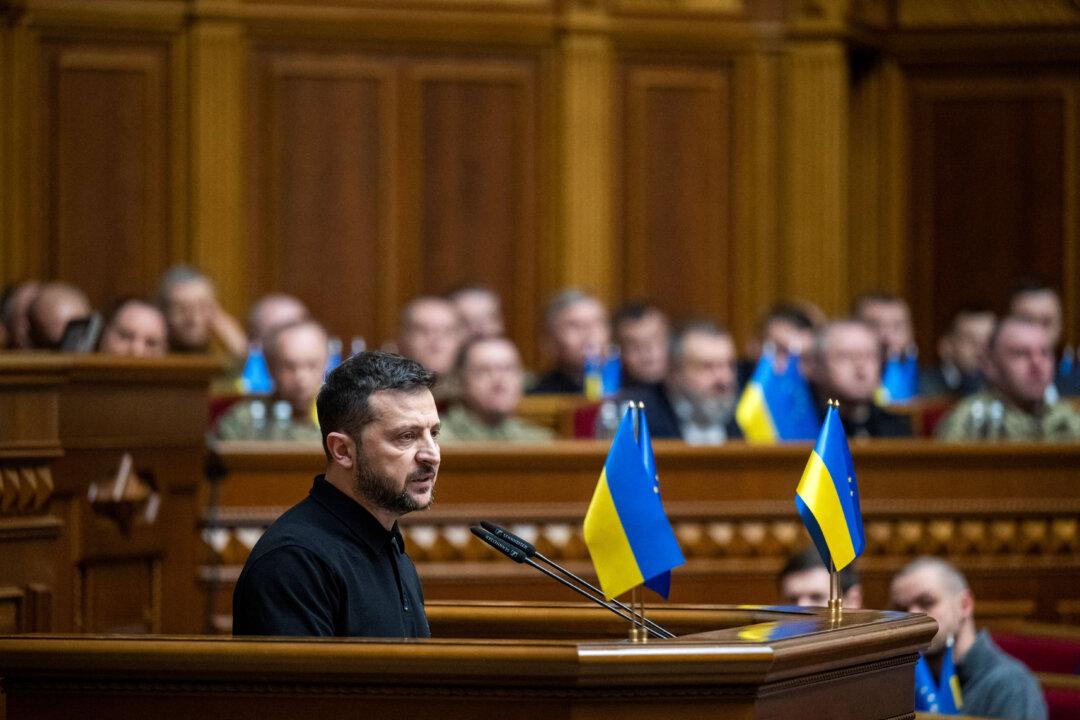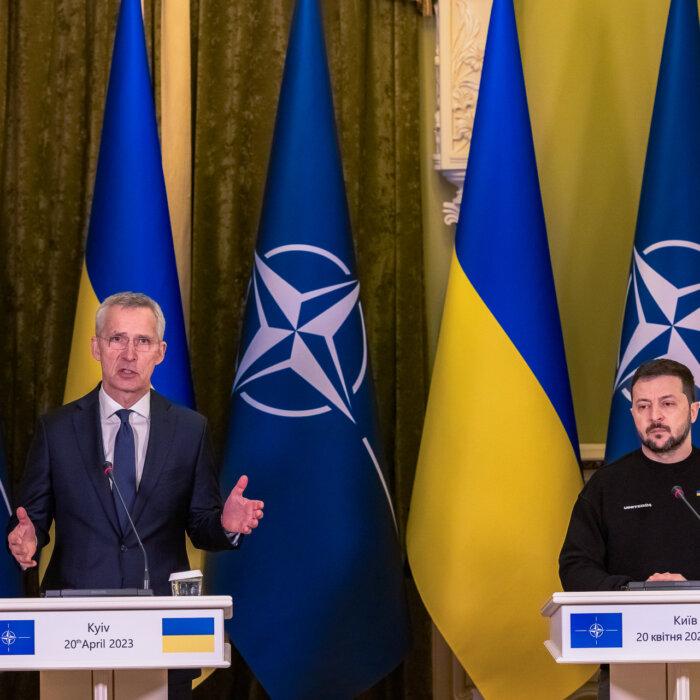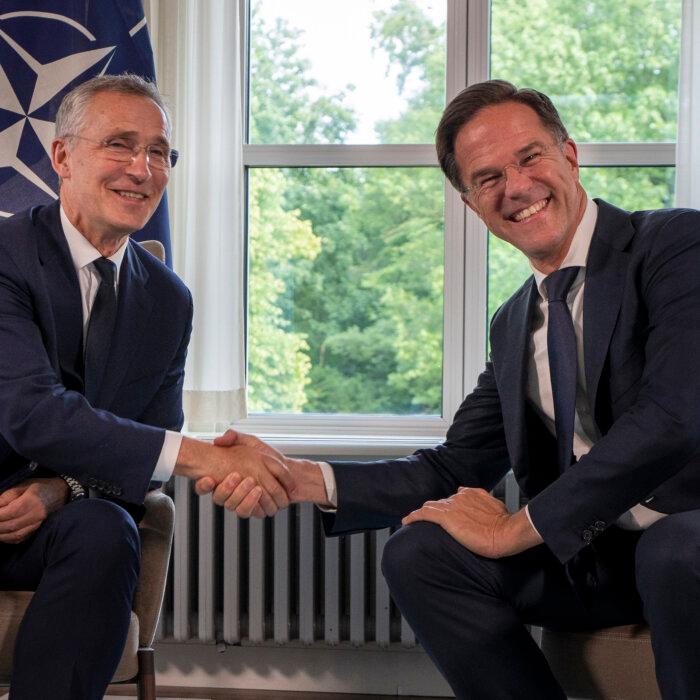Ukrainian President Volodymyr Zelenskyy has unveiled part of his “victory plan” to his country’s parliament in Kyiv.
Zelenskyy previously discussed the strategy with U.S. President Joe Biden and several other Western leaders, none of whom have given it their public support.
The plan includes formally applying to join NATO, and Zelenskyy in his Oct. 16 address to the Ukrainian Parliament said, “We understand that NATO membership is a matter of the future, not the present.”
Zelenskyy said Ukraine’s air defenses needed to be “irreversibly strengthened,” and he set out a number of ways to achieve that, including securing the removal of restrictions on the use of long-range missiles, imposed by the United States and other Western nations.
He said Ukraine’s Western allies should further deter Russia by offering a “comprehensive non-nuclear strategic deterrence package” on Ukrainian soil.
Zelenskyy also proposed Ukraine sign an agreement with the United States, the EU, and other Western countries to export Ukraine’s natural resources, which he said were worth trillions of dollars.
“These include, in particular, uranium, titanium, lithium, graphite and other strategically valuable resources that will strengthen either Russia and its allies or Ukraine and the democratic world in global competition,” he said.
Finally he offered Ukrainian troops to replace U.S. forces currently stationed, at great expense, in Europe.
“The Victory Plan is a path to strengthening Ukraine. This is exactly the kind of Ukraine’s strengthening that is needed not only to defend our positions but also to build a bridge, a bridge to the second peace summit, which will put a fair end to this war for Ukraine,” Zelenskyy said.
‘Plan Means Something’
Zelenskyy said three secret addendums to the victory plan won’t be published, but will be shared with the United States and NATO.Ukraine opposition parliament member Oleksii Honcharenko said the victory plan is “not a plan.”
“Plan means something with concrete steps. It’s kind of a wish list from Ukraine for our partners, how they can and should support us,” Honcharenko said.
“And it doesn’t look realistic. We were waiting for some real serious conversation about the situation and the strategy, and this is not that.”
The Kremlin said it was too early to comment in detail on the plan but said Kyiv needed to “sober up” and realize the futility of its policies.
Kremlin spokesman Dmitry Peskov said the plan was probably similar to the U.S. plan which, he claimed, was about using Kyiv to fight against Russia “until the last Ukrainian.”
Republican nominee and former U.S. President Donald Trump has said he would end the war quickly and has hinted at a deal between Russia and Ukraine, while the Democratic nominee, Vice President Kamala Harris, has suggested she would continue Biden’s policy of supporting the Ukrainian war effort indefinitely.
After Ukraine pulled troops out of its eastern front to launch an incursion into Russian territory near Kursk in the summer, the Russians made significant advances on the weakened front line and are getting close to taking the vital logistics hub of Pokrovsk.
Zelenskyy Talked With Rutte
On his latest update to the nation, posted online on Oct. 15, Zelenskyy said: “Yesterday I spoke with Mark Rutte, NATO Secretary General. We coordinated our positions on strengthening Ukraine. Thank you, Mark, for your support!”Rutte visited NATO’s Ukraine mission in Wiesbaden, Germany, on Oct. 14 and said, “The message [to Russian President Vladimir Putin] is that we will continue, that we will do what’s necessary to make sure that he will not get his way, that Ukraine will prevail.”
Ukraine has lost a fifth of its territory and tens of thousands of lives in the conflict, and without a military victory it would be unable to recover the Donbas, Crimea or the swathe of territory between Melitopol and Kherson.
NATO Wants to ‘Minimize Risk’
Andrew Corbett, a lecturer in the Defense Studies Department at King’s College London, previously told The Epoch Times, “NATO is treading an exquisite balance between sustaining Ukrainian defense while seeking to de-escalate the conflict and minimize the risk of direct conflict with Russia.”Ukraine argues that if it were in NATO it would be protected from any future invasion by Russia, but Biden and other Western leaders appear lukewarm on the idea.

In recent weeks, Brazil and China have been pushing a peace plan.
On Sept. 27, Chinese Foreign Minister Wang Yi and Brazilian foreign policy adviser Celso Amorim co-hosted a meeting at the United Nations in New York City that was attended by 17 countries, including Turkey and Indonesia.
Wang said afterward, “Russia and Ukraine are neighbors that cannot be moved away from each other and amity is the only realistic option.”
But Zelenskyy told the U.N. General Assembly the “alternatives, half-hearted settlement plans, so-called sets of principles” contained in the China/Brazil plan would just help Moscow.
China and Russia signed a “no limits” agreement strengthening their relationship three weeks before Moscow invaded Ukraine in February 2022.







